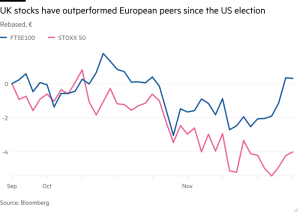Dear Kamala: a letter from Pennsylvania
This article is an on-site version of our Swamp Notes newsletter. Premium subscribers can sign up here to get the newsletter delivered every Monday and Friday. Standard subscribers can upgrade to Premium here, or explore all FT newsletters
Some polls show that Kamala Harris is starting to close the gap with Donald Trump in certain swing states. Others still show that it’s likely to be a nail biter of a race to the very end, one that will be decided — like the past two were — in Wisconsin, Michigan and Pennsylvania.
Swamp Notes readers will know that I’m extremely interested in the industrial heartland for reasons that are economic, political and personal, so I’ve been spending a lot of time talking with individuals on the ground, people who really know what’s going on in those places.
One of my best sources of political information about real people in the heartland recently brought me into a fascinating conversation with a friend we will call Jim. I think the conversation says a lot about where we are in this election, and what Democrats in particular must think about not only before, but also after November. Bear with me, as this Note is longer than usual.
The story goes like this: Jim is a proud son of working-class Philadelphia, and a man whose business is advising the owners of small companies (Republicans and Democrats, never-Trumpers and Maga devotees). This work takes him all over Pennsylvania’s cities, suburbs and rural communities. Jim comes from a union family, and is an intellectual — a student of history, politics and economics who has befriended some of America’s leading public intellectuals.
My source asked Jim: “What kind of moment are we in now, politically? It seems like uncharted territory.”
He replied: “It’s a once-in-a-generation moment for a potential once-in-a-generation politician to really change the tide of the country’s future. Just think about it. Working people know they’ve been screwed by the policies of the last few decades. They don’t need to be told how things are going for them. They KNOW WHAT’S WHAT. Trump comes along and tells everyone he’s going to make them feel great again. He gets thrown out of office because of his incompetence. Biden takes office and passes great jobs-producing bills that focus on infrastructure and climate change, etc.
“But he can’t seem to sell these accomplishments. Why not? His age is a factor, sure. But the main reason — what lies in the gut of all former Democrat voters who switched to Trump — is that Biden never acknowledged what they know to be the truth. That for decades the Democratic party embraced the Republican free-market, free-trade, ‘everyone is on their own’ policies that left them in poor financial straits.”
For Jim, the solution to this is clear: you begin with an apology, and then welcome people home to the Democratic party. Jim believes Harris can do what Joe Biden could not. But he also believes that to do so, she’s going to have to adopt a message that will defy the cautious advisers who, Jim reminds us, “are the same people who have her tied against the worst politician in the history of politics!”
Bottom line: Harris must admit the Democratic party’s mistakes in order to win the swing states. So what should that apology sound like?
“If I were writing her speeches,” says Jim, “I would absolutely start with the following: ‘I am not telling you folks who you should vote for. I’m here to tell you I understand the leaders of the Democratic party in the past let you down. And as the standard-bearer for this party going forward, it’s my responsibility to make those apologies. Our party was built on the foundation of President Roosevelt’s New Deal, which created the middle class.
“But starting in the 1980s and up through Donald Trump’s final days in office, many Democratic leaders embraced Republican, Wall Street-friendly policies that betrayed working- and middle-class Americans. Even Joe Biden will tell you he voted for bills that he now regrets. I am here to tell you the leaders of our party were wrong, and Joe Biden and I have started to make amends for those bad policy decisions.’”
Politically savvy Swamp Notes readers may at this point be thinking, what the heck? Why should Harris apologise when she’s gaining ground? Shouldn’t she just promote the pro-worker policies that she and Biden pushed through and let sleeping dogs lie? Or perhaps some readers might think it’s not worth pissing off rich donors in California to try and win back union members in the Mon Valley (for more on what’s happening there and why it matters so much, see my column today.
But Jim says no; he believes that in order to win the swing states and to re-establish Democrats as the party of choice for working people going forward, “this apology must happen first. Without it her campaign will be wasting her talent and this unique moment in history to reset the deck for the Democratic party as the party of working people and the middle class.”
To Jim, this is Human Relations 101. “Think about a marriage,” he said. “You’re in a major fight with your spouse, which let’s say is 100 per cent your fault. To make amends you do something nice for your spouse. But we all know if we don’t apologise first, the nice gesture will ring hollow because there was no ownership of what we did wrong. I am convinced, and the evidence in the polls isn’t proving me wrong, this is the reason why the voters aren’t giving credit to Biden for his policy achievements.”
Jim had another piece of psychological wisdom that I entirely agree with. “You have to understand human psychology. When vulnerable people are taken advantage of, there is a unique dynamic where that anger turns with greater fury to the ones who were supposed to be their advocates and protectors, who allowed the harm to happen, more so than to the people who actually caused them harm. Donald Trump recognises this and has tapped into it.”
As the South Africans have shown, you can’t have reconciliation without truth. Jim firmly believes that the apology and an invitation to come home again could win Harris the race. “People want to come back home. At least 5 per cent of the electorate that are former Democrats, voted for Trump, and are leaning towards him in these three swing states, know deep down they’re in bad company and they’re looking for someone to welcome them home.
“Harris has the charisma, grace and warmth to do that. These are God-given attributes that can move mountains. She can welcome them home and many will come.” Jim had one final and rather poetic point that is worth sharing.
“Booker T Washington once said: ‘Cast down your bucket where you are,’ for there is water beneath us. Harris needs to drop the bucket, make the apology, then tout her and Biden’s accomplishments and what’s to come! There is sweet water beneath us! Trump is a bubble ready to burst. The hard legislative work is already in progress. A simple apology will burst the Trump bubble. You don’t need high-paid consultants or focus groups to tell you any of this. You just need to live here and know the people.”
Sounds right to me.
Peter, what would you say to Jim?
Recommended reading
-
Interesting ideas from former Indiana governor Mitch Daniels on how the US should prepare for a post-dollar world, given the rise in public debt and the desire of many countries to move away from the dollar as a reserve. This isn’t imminent, but Swamp Readers will know that I share Daniels’ concerns: See my first piece on the topic from 2020, and a follow-up in 2022.
Peter Spiegel responds
Rana, I don’t agree with Jim, but I’ve made clear here before that I don’t think a policy shift towards a more protectionist outlook on trade and markets was either good policy or good politics for Harris. But I’m more intrigued by Jim’s suggestion of the political apology as a campaign tactic. Modern American history would suggest it’s not always a popular move.
Much depends on how big the mistake is that the politician is apologising for. Bill Clinton apologised for his affair with Monica Lewinsky, but voters viewed the sin as so large — and his lying about it was so extensive — that it’s hardly seen as a political masterstroke. Clinton’s reputation never really recovered, and he’s still a figure of controversy in some quarters of the Democratic party, especially in a modern era when a powerful male leader having inappropriate relations with a subordinate is rightly viewed as a firing offence.
By contrast, Barack Obama’s decision to apologise for the bungled rollout of healthcare.gov, the internet portal set up to register for new insurance plans under the Obamacare scheme, was an expression of regret for a relatively small sin. Yes, the consequences were horrific for Americans who lost their health insurance thanks to a buggy website. But nobody really thought it was Obama’s fault in the first place, and it was a minor issue in the grand sweep of governance. Obama’s popularity bounced back and Obamacare is now widely popular.
Two decades of Democratic policy orthodoxy is a pretty big thing to ask forgiveness for. Too big, in my view. It also could backfire spectacularly. Trump is trying to paint Harris as a big-government, San Francisco liberal, and many of the “Jims” I’ve talked to in swing states are reluctant to support her for exactly that reason. Publicly apologising for an economic policy that is widely seen as moderate and centrist is not going to help overcome Trump’s narrative.
So, Jim, I’m sorry. As a journalist, I think a big, dramatic apology for the Democratic party’s centrist shift on economic policy since the Clinton administration would be a great story, particularly for a news organisation that’s called the Financial Times. But it would also be bad politics.
Your feedback
We’d love to hear from you. You can email the team on [email protected], contact Peter on [email protected] and Rana on [email protected], and follow them on X at @RanaForoohar and @SpiegelPeter. We may feature an excerpt of your response in the next newsletter
Recommended newsletters for you
US Election Countdown — Money and politics in the race for the White House. Sign up here
Unhedged — Robert Armstrong dissects the most important market trends and discusses how Wall Street’s best minds respond to them. Sign up here
#Dear #Kamala #letter #Pennsylvania




